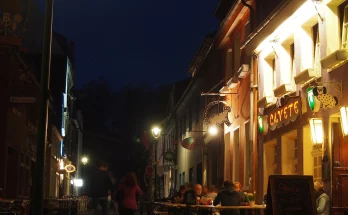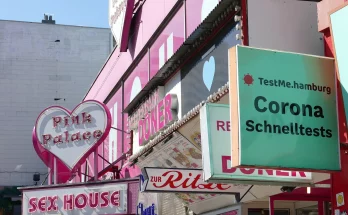A recent raid at Cologne’s Pascha brothel has led to new developments in an ongoing investigation targeting a smuggling gang. Prosecutors are now also looking into possible money laundering activities connected to the property.
Smuggling and money laundering
According to Senior Prosecutor Daniel Vollmert from the Düsseldorf Public Prosecutor’s Office, the raid is linked to a broader smuggling case. Investigators are exploring whether funds from the alleged smuggling operation were used to acquire or finance the brothel.
Evidence gathered during the Thursday raid includes financial records tied to the purchase of the Pascha property.
The focus of the investigation is on financial transactions linked to the brothel’s ownership. Investigators are analyzing whether assets connected to illegal activities were involved in the property’s acquisition. The brothel’s operations were not disrupted during the raid, as searches were limited to office spaces. The evidence gathered will take weeks, if not months, to fully examine, according to Prosecutor Vollmert.
The last raid took place a month ago
This is not the first time Pascha has been in the spotlight. Few months ago, authorities seized the property as part of a temporary measure in the same smuggling investigation. Owners of the eleven-story pink building are currently barred from selling it.
The smuggling network allegedly secured residency permits for wealthy individuals from China and Oman, according to the prosecutor’s office. In April, police raided properties in eight different states, and two lawyers from the Cologne area are suspected to be at the center of the operation. Additionally, there are concerns that public officials may have been bribed in connection with these activities.
Read our previous article about Pascha:
Don’t miss our other articles
A new cyberbrothel opened in Berlin, combining advanced artificial intelligence (AI) with sex dolls to offer a unique experience. Customers can book rooms to interact with AI-enhanced dolls, a service that has generated both interest and controversy. While some see it as a judgment-free space, critics express concerns about data privacy and the impact on real human relationships: Cyberbrothel has been opened in Berlin
In Zurich, Sister Ariane and Pastor Wolf, through their organization Incontro, are making a difference by supporting the city’s poor and marginalized, including sex workers in the Langstrasse area. Every day, they distribute food to hundreds of people, including refugees and homeless individuals. Their efforts also extend to the red-light district, where they provide care and support to sex workers, many of whom face exploitation and trauma. Despite the wealth of Zurich, hidden poverty remains a serious issue, and human trafficking continues to affect the sex industry across Europe: Supporting Zurich’s poor sex workers
The COVID-19 pandemic has had a major impact on Vienna’s sex industry, leading to the closure of many legal brothels and a decline in registered sex workers. Recent data shows that one-third of these businesses and workers have disappeared since the pandemic. Many sex workers have shifted to operating illegally from apartments to avoid high costs, which has increased risks for their safety and health. Despite Austria’s strict and well-regulated legal framework for sex work, the pandemic has caused significant changes in how the industry operates: One-third of brothels disappeared after COVID



